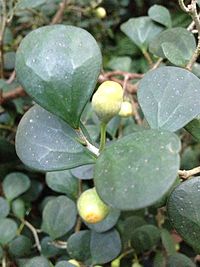
Photo from wikipedia
The present research aimed to investigate the attenuative effects of watermelon (Citrullus lanatus) leaf extract on biochemical and histological parameters in a high-fat diet combined with a low-dose streptozotocin (HFD/STZ)-induced… Click to show full abstract
The present research aimed to investigate the attenuative effects of watermelon (Citrullus lanatus) leaf extract on biochemical and histological parameters in a high-fat diet combined with a low-dose streptozotocin (HFD/STZ)-induced type 2 diabetes mellitus. Forty male Sprague Dawley rats were divided into five groups, including three supplemented groups: 10 mg metformin/kg BW (HFD/STZ +M), 200 mg watermelon leaf extract /kg BW (HFD/STZ + LD), and 400 mg watermelon leaf extract /kg BW (HFD/STZ + HD). The efficacy of the 6-week intervention was evaluated by measuring body weight, fasting blood sugar, serum insulin, lipid profile, superoxide dismutase, catalase, malondialdehyde, and serum liver markers. Kidneys and liver structure were defined by histopathological examination. Results revealed that intervention with watermelon leaf extract attenuated the biochemical parameters and the structural changes in kidneys and liver. In brief, the watermelon leaf extract treatment could effectively decrease complications associated with diabetes better than metformin, and that the treatment with 400 mg/kg BW is the most potent. PRACTICAL APPLICATIONS: This was the first study to investigate the antidiabetic potential of watermelon leaf extract in obese diabetic rats. Data revealed that the watermelon leaf extract significantly attenuated the HFD/STZ-induced diabetes changes, as evidenced by the biochemical and histological data. Hence, watermelon leaf could be an excellent candidate to be developed as a functional food ingredients or nutraceuticals for holistic management of diabetes mellitus and its complications.
Journal Title: Journal of food biochemistry
Year Published: 2022
Link to full text (if available)
Share on Social Media: Sign Up to like & get
recommendations!